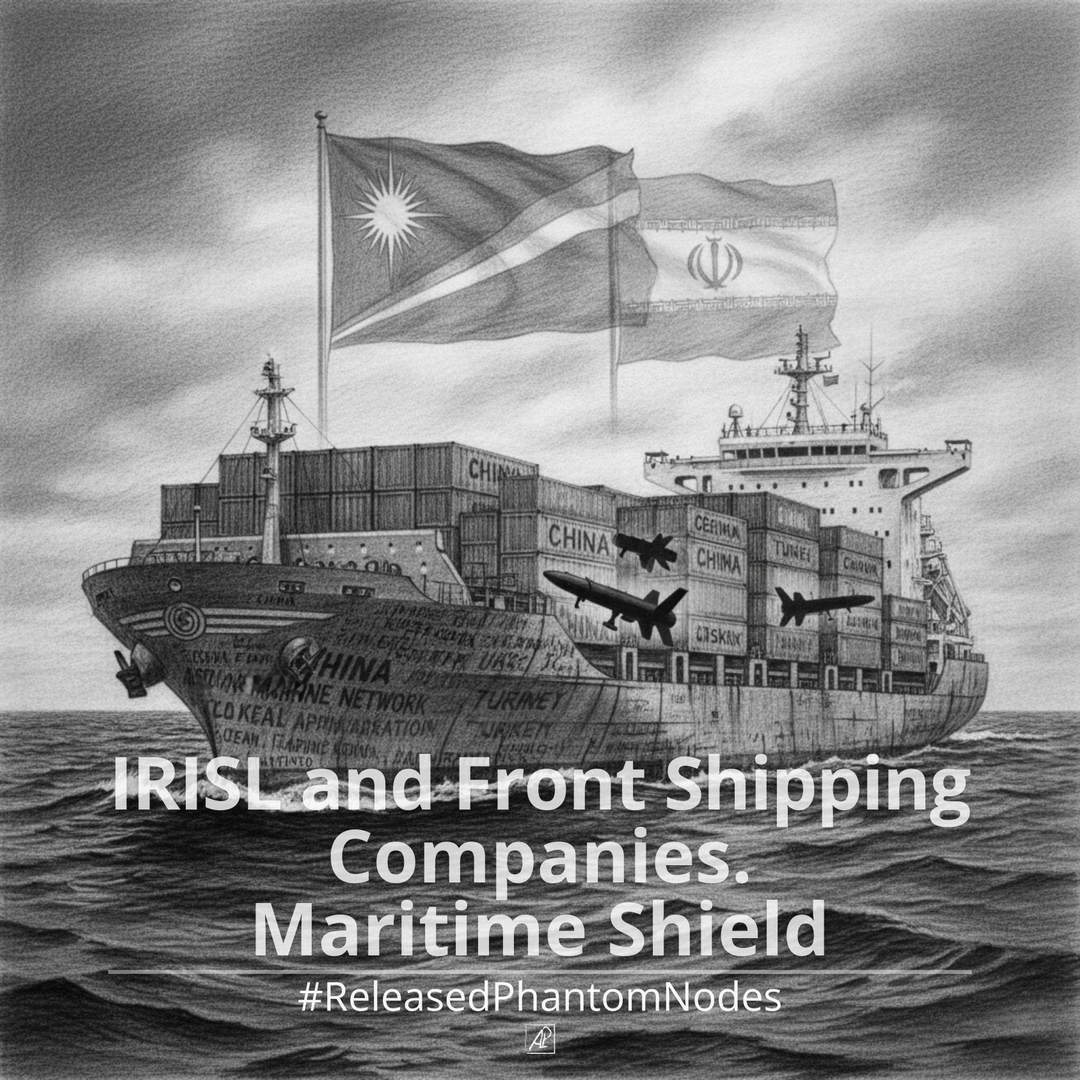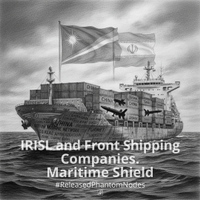
🕳️ Released Phantom Node 83: IRISL and Front Shipping Companies. Maritime Shield
- Foundation date
26 October 2025
This project is a philosophical and artistic study of the phenomenon of "phantom nodes" — invisible yet influential objects and subjects in the contemporary global system. The descriptions contained within this study are metaphorical and allegorical, aimed at uncovering systemic problems, regimes, and civilisational influences. They are not a journalistic investigation or legal accusations, but serve as an artistic interpretation of reality.
Names are included because they appear in open international sources.
This creation is protected and cannot be used by third parties for the purpose of supporting, propagating, or legitimizing criminal regimes, terrorist states, and organizations operating in the shadows. The use of data or analysis results from this project, whether in part or in full, is expressly prohibited if the objective is to support or conceal their criminal activity.
The project may be freely used by individuals and organizations that combat evil, corruption, and aggression.
Mode: Global Maritime Obfuscation
🕳️ Released Phantom Node 83: IRISL and Front Shipping Companies. Maritime Shield
Infrastructure of Hidden Logistics.
Who is this?
The Islamic Republic of Iran Shipping Lines (IRISL) and its web of front companies (Ocean Capital Administration, Asia Marine Network etc.) operate as a state-controlled fleet concealing the transport of sanctioned goods — oil, weapons components, and proxy-bound cargo. They form the final physical link in Iran’s global evasion architecture.
Type of node:
Maritime logistics / state export
Status:
Formally legal, de facto sanction-evasive and IRGC-directed
Form of control:
Front ownership chains, flag-switching, fake bills of lading, AIS manipulation, offshore registration
Phantom image:
A vast container ship under clouded skies; blurred names along its hull; a ghostly flag shifting its design above; inside containers — faint shapes of missiles and drones.
What remains after the phantom:
A maze of offshore records and shadow registries distorting global shipping integrity.
Core of the node:
What sustained it?
State funding, IRGC support, opaque jurisdictions, weak IMO oversight, and profitable shadow routes.
How did it become a phantom?
After sanctions, IRISL splintered into front entities and flagged ships worldwide, masking identity through global re-registration.
Why does the phantom still exist?
Dependence on maritime transport, offshore secrecy, leniency of flag states and economic benefits for third-party jurisdictions.
Phantom’s condition:
Active, multi-jurisdictional, embedded in global trade.
After the regime:
– Audits of ship registries and front ownership.
– AIS transparency enforcement.
– Expanded sanctions on IRISL and affiliates.
– Maritime governance reforms.
Collective reaction:
The sea must not harbor crime. We call for restoration of trust in maritime law and transparency.
Core principle:
A fleet that changes flags loses its face — transparency is the only anchor of responsibility.
Alt-text:
Graphite drawing: a container ship with blurred markings sails under a gloomy sky; a shifting flag floats above; missile silhouettes peek from containers.
The image simultaneously displays the Flag of Iran and the Flag of the Marshall Islands. This symbolizes a key sanctions evasion scheme: IRISL registers its vessels under a "flag of convenience" (like the Marshall Islands, which has an open registry) to mask the genuine Iranian ownership and legitimize the maritime transport of sanctioned goods.
#ReleasedPhantomNodes #ReleasedPhantomNode #Phantom #PivtorakStudio #MemoryOn #IRISL #MaritimeShield #GlobalObfuscation #ShadowShipping #Offshore #AIS #FlagSwitching #Smuggling #OilTransport #WeaponCargo #ShipToShip #ProxyLogistics #MaritimeShadow #BandarAbbas #FreeZone #Panama #MarshallIslands #Belize #HiddenFleet #SanctionsEvasion #OceanRoutes #IRGCFleet #PortNetwork #GlobalTrade #LogisticsUnderShadow
Unmasking the Phantom. Pivtorak.Studio. 26.10.2025
🛡️ This project is an artistic and philosophical exploration. All depictions are allegorical; the piece does not allege facts about specific private individuals without corroborated evidence.
Names are included because they appear in open international sources.
🫧 Phantom Node Dossier 83: The Maritime Shield: IRISL and Front Shipping Companies. The "Global Maritime Obfuscation" Regime.
Key Aspects of the Phantom:
"The Global Maritime Obfuscation Regime" (or "Covert Logistics Infrastructure"). The essence of this node is the systematic utilization of the state-owned shipping company Islamic Republic of Iran Shipping Lines (IRISL) and its extensive network of front companies (e.g., Ocean Capital Administration, Asia Marine Network, Leading Maritime Pvt Ltd) for the clandestine transportation of sanctioned goods. This includes Iranian oil (Node 78), weapon components (Node 79), and weapons for proxy forces (Node 82), by manipulating flags, vessel names, and documentation to evade detection and sanctions.
Regimes (which it directly shapes/supports):
🏴☠️ Regime of "Flag and Ownership Hopping": Systematic alteration of vessel registration (flag, owner, operator) through a cascade of shell companies located in various jurisdictions to mask connections to IRISL.
🚢 Regime of "Concealed Cargo": Using IRISL container shipments to transport critical military components and weapons, often declared as "humanitarian aid" or "general goods," hidden amongst legitimate cargo.
🌍 Regime of "Global Logistics Network": IRISL and its subsidiaries provide wide geographical reach, utilizing ports in Asia (China, Malaysia), the Middle East (UAE, Turkey), and Africa as transit hubs.
⚙️ Regime of "Infrastructure Support": Providing logistical backbone for IRGC maritime operations and the fleet (Node 78), including transporting necessary materials for naval bases and oil platforms.
Tools (which it actively uses/oversees):
⚓ IRISL Fleet: A vast number of container ships, tankers, and dry bulk carriers formally owned by various "independent" companies but de facto controlled by IRISL.
📜 False Bills of Lading: Creation of forged or altered documents indicating false origin, value, and ultimate consignee of cargo to bypass customs inspections.
🛰️ AIS Manipulation: Frequent disabling or spoofing of Automatic Identification System signals of vessels to avoid tracking, especially during ship-to-ship oil transfer operations.
🌐 Offshore Jurisdictions: Registration of front companies in jurisdictions with low transparency and regulation (e.g., Marshall Islands, Panama, Belize), complicating the identification of true beneficial owners.
Civilizational Influences (which it embodies/exploits):
🚨 Threat to Maritime Security: Creation of a "gray zone" in international waters where shipping rules and safety are disregarded, increasing the risk of incidents and pollution.
⚖️ Undermining International Trade Law: Systematic violation of international maritime conventions, regulations, and sanctions regimes, eroding the foundations of global trade and maritime law.
💰 Funding Aggression: Directly facilitating the transport of primary revenue sources (oil) and means of aggression (weapons), which is vital for sustained military programs and proxy group support.
📉 Discrediting Global Ship Registries: The use of third-country ship registries to mask IRISL vessels undermines trust in these global registration and control systems.
Dissection of a Phantom Node. Pivtorak.Studio. 26.10.2025
🛡️ This project is an artistic and philosophical exploration. Depictions are allegorical and do not allege facts about private individuals without corroborated evidence.
Names are included because they appear in open international sources.

